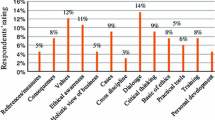Abstract
This paper reports the results of a four year study to measure the effect of a Business and Society course on the ethical judgment of students. The research involves a matched pre/post survey with control design, with the Business and Society course functioning as the treatment variable. The subjects were undergraduate and graduate (M.B.A.) business students (n=460). The answer to the question posed by the title of this paper is yes, in a more ethical direction.
Similar content being viewed by others
References
Arlow, P. and Ulrich, T. A.: 1980, ‘Business Ethics, Social Responsibility and Business Students: An Empirical Comparison of Clark's Study’,Akron Business and Economic Review 11 (Fall), pp. 17–22.
Arlow, P. and Ulrich, T. A.: 1985, ‘Business Ethics and Business School Graduates: A Longitudinal Study’,Akron Business and Economic Review 16 (Spring), pp. 13–17.
Barach, J. A. and Nicol, E. A.: 1980, ‘Teaching Ethics in Business School’,Collegiate News and Views (Fall), pp. 5–8.
Baumhart, R.: 1968,Ethics in Business (Holt, Rhinehart and Winston, New York).
Boyd, D. P.: 1981–1982, ‘Improving Ethical Awareness Through the Business and Society Course’,Business and Society 20(1) and21(1), pp. 27–31.
Cohen, E. and Cornwell L.: 1989, ‘A Question of Ethics: Developing Information System Ethics’,Journal of Business Ethics 8(6), pp. 431–437.
Derry, R: 1987, ‘Moral Reasoning In Work-Related Conflicts’, In W. C. Frederick and L. E. Preston (Eds.) RESEARCH IN CORPORATE SOCIAL PERFORMANCE AND POLICY9, pp. 25–49.
Fritzsche, D. J. and Becker H.: 1984, ‘Linking Management Behavior to Ethical Philosophy — An Empirical Investigation’,Academy of Management Journal 27, 166–173.
Gilligan, C: 1982,In a Different Voice: Psychological Theory and Women' Development (Harvard University Press, Cambridge, Mass).
Glenn Jr., J. R.: 1987, ‘Comparing Future & Practicing Manager's Ethical Attitudes’, San Francisco State University, School of Business Working Paper.
Glenn Jr., J. R.: 1989, ‘Business Curriculum & Ethics: Student Attitudes and Behavior’Business & Professional Ethics Journal VII (3, 4), pp. 167–185.
Glenn Jr., J. R.: 1990, ‘Business Students and Ethics: Implications for Professors and Managers’, Chapter fromEnriching Business Ethics, C. M. Walton (ed.) (Plenum Press, New York), pp. 213–231.
Glenn, Jr., J. R. and Van Loo, M. F.: 1988, ‘Business Students' & Practitioners' Ethical Decisions Over Time’, University of California, Berkeley Business School Working Paper No. BPP-34.
Jones, T. E., Thomas T., Agle B.: 1991, ‘Gauging The Impact of Business Education on the Moral Development of Students’, paper for the second annual meeting of the International Accociation For Business and Society, Sundance, Utah, March 1991.
Martin, T. R.: 1981–1982, ‘Do Courses in Ethics Improve the Ethical Judgment of Students?’,Business and Society 20(1) and21(1), 17–26.
Penn Jr., W. Y. and Collier B. D.: 1985, ‘Current Research in Moral Development as a Decision Support System’,Journal of Business Ethics 4, 131–136.
Purcell, T. V.: 1977, ‘Do Courses in Business Ethics Pay Off?’,California Management Review 19(4), 50–58.
Rest, J.: 1974, ‘Judging the Important Issues in Moral Dilemmas — An Objective Measure of Development’,Developmental Psychology 10, 491–501.
Rest, J.: 1979, Development in Judging Moral Issues (University of Minnesota Press, Minneapolis, MN).
Rest, J. R. and Toma, S. J.: 1986, ‘Moral Judgment, Behavior, Decision Making, and Attitudes’, in J. R. Rest,Moral Development: Advances in Research and Theory (Praeger Press, New York).
Stead, J. S. R.: 1988, ‘Can Social Awareness be Increased through Business School Curricula?’,Journal of Business Ethics 7, pp. 553–560.
Surlin, S. H.: 1987, ‘Value system Changes by Students As Result of Media Ethics Course’,Journalism Quarterly 64(2–3), pp.564–568, 676.
Weber, J.: 1990, ‘Measuring the Impact of Teaching Ethics to Future Managers: a Review, Assessment and Recommendations’,Journal of Business Ethics 9, pp. 183–190.
Wynd, W. R. and Mager, J.: 1989, ‘The Business and Society Course: Does It Change Student Attitudes?’,Journal of Business Ethics 8(6), pp.486–491.
Additional information
James R. Glenn, Jr. is Professor of Management in the School of Business at San Francisco State University. His research focus is on the ethical dimensions of decisions made in business, professional and medical organizations. His writing on decision making, research and teaching business ethics has appeared in several periodicals and books. He is currently revisingEthics in Decision Making (John Wiley, 1985) for a second edition.
Rights and permissions
About this article
Cite this article
Glenn, J.R. Can a Business and Society course affect the ethical judgment of future managers?. J Bus Ethics 11, 217–223 (1992). https://doi.org/10.1007/BF00871969
Issue Date:
DOI: https://doi.org/10.1007/BF00871969




